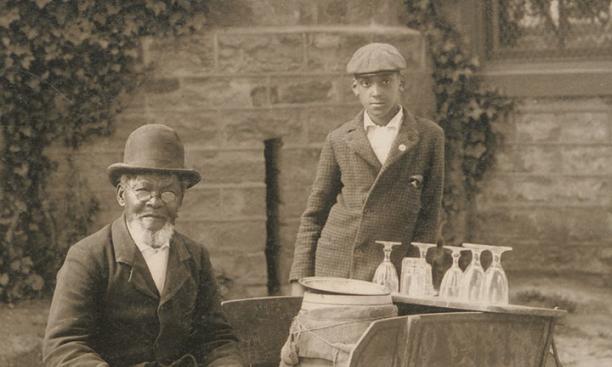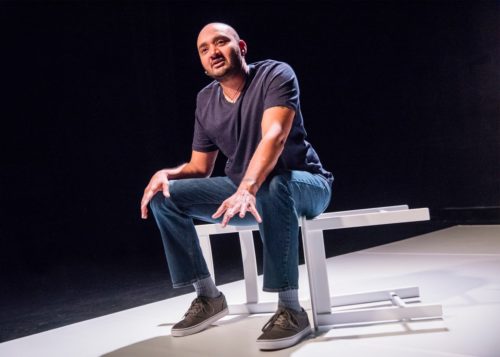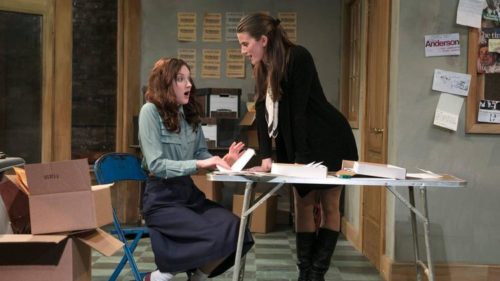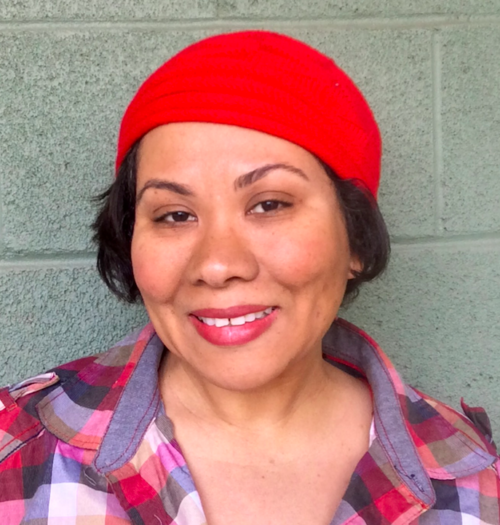Check out Midday on WNYC‘s podcast: A Play on the Trans Experience, Through Voices of Family with Mashuq Mushtaq Deen, Resident Playwright at New Dramatists, who discusses the New York premiere of Draw the Circle.

Check out Midday on WNYC‘s podcast: A Play on the Trans Experience, Through Voices of Family with Mashuq Mushtaq Deen, Resident Playwright at New Dramatists, who discusses the New York premiere of Draw the Circle.

In the fall semester, alumni Peter Mills ’95 and Cara Reichel ’96 of Prospect Theater Company taught a Princeton Atelier seminar in which undergraduates created original musical theater works inspired by the work of the Princeton & Slavery Project. (Readings of a one-act musical drawn from their compositions will be presented at Nassau Hall Jan. 13.) In this audio feature, PAW intern Douglas Corzine ’20, a student in the course, takes us inside the challenges of telling these compelling stories in musical form.

Listen to the full transcript from Princeton Alumni Weekly here.

Mashuq Mushtaq Deen has a good story to tell in “Draw the Circle,” and a fresh way to tell it. It’s an autobiographical solo show about gender transition in which he plays his parents, his classmates, his doctors and his girlfriend – everyone but himself.
By the end he’s fully there, along with projected statistics about the rising U.S. murder rate of transgender people. This activist theater is molded from the raw material of being born to traditional Muslim Indian immigrants to the United States and assigned female; before the show starts, we see a photo of Deen as a young girl.
This 80-minute piece is running in rep at the Atlas Performing Arts Center with another hot-button solo act, Dan Hoyle’s “The Real Americans” – a survey of strangers Hoyle met during fact-finding road trips through the heartland. Hoyle may be a slightly more limber mimic than Deen, but Deen’s tale unspools more naturally.
Deen’s problem for years was feeling invisible (and worse), which is how we experience him as he takes on the voices of the people who give us his history of gender transition. Dressed in jeans and a blue T-shirt, he chronicles, with surprising empathy, not just what it was like to slowly, painfully come to terms with transition, but what it was like for loved ones who shunned everything about it. The father’s a card able to tell jokes, but the mother is sheer distress and shame. She frets about what the relatives back in India will think and laments the daughter – Shireen was Deen’s name, we are told – she feels she has lost.

Viewpoints come from a wide-eyed niece and, perhaps most poignantly, from Molly, who fell in love with Shireen and was then challenged by Shireen’s evolution to Deen. The names of each character are helpfully projected on the back wall; Deen does good work switching vocal patterns and postures, but he’s more compassionate than chameleonic in his characterizations.
Director Chay Yew – a playwright himself, and artistic director of Chicago’s Victory Gardens Theater – keeps the lean performance percolating briskly. It’s all about the information: the stage is a bare white square floor furnished with only a plain white chair. There is nothing else but the names on the screen, and the narrative.
Trans playwrights are still emerging, which puts Deen’s show in the vanguard here (and let’s credit Mosaic Theater for boldly expanding its repertoire all the time). The story’s framework is simple yet striking, and more than a novelty: it’s an apt, big-hearted way to puzzle together many pieces of Deen’s journey. “Draw the Circle” does not sugarcoat his despair or incidents of violence, yet it rather amazingly reaches back to retrieve people who easily could have been cut out for life. The wrathful moment confronting us with the ongoing violence against trans people does not define the tone of this personable, entirely approachable show. Inarguably, though, it’s that flicker of wrath that gives the piece its purpose.
Draw the Circle , written and performed by Mashuq Mushtaq Deen. Directed by Chay Yew. Lights, Mary Louise Geiger and E-Hui Woo; set, Chay Yew; sound design, Matthew M. Nielson. Through Dec. 24 at the Atlas Performing Arts Center, 1333 H St. NE. Tickets $35-$65. Call 202-399-7993 or visit mosaictheater.org.
Review by Nelson Pressley for The Washington Post.

Did you vote for John B. Anderson in 1980?
If you were of age and followed the advice of this newspaper, which endorsed the moderate congressman from Illinois in the Republican primary over Ronald Reagan, you would have placed your trust in the man the Tribune said “best represents the qualities needed to win nomination and election — and having won those to be a strong, effective president.”
But Anderson lost that primary to Reagan and ran instead as an independent candidate, a move too quixotic for the Tribune, which subsequently offered its then-customary support for the Republican nominee, in this case the governor of California. Anderson started strong in the general election but tanked. He eventually got less than 7 percent of the vote.
So what was it like working in one of his campaign offices?
That’s the question posed by “1980 (Or Why I’m Voting for John Anderson),” a highly enjoyable and mercifully unpredictable world-premiere play by the experienced scribe Patricia Cotter, open now for voting at the Jackalope Theatre on Chicago’s North Side. On one level, “1980” is a bit like a sitcom of losers, a kind of “Superior Donuts” or a “Parks and Rec,” only set in a regional Boston office of a failing indie campaign.
You have Brenda (Evelyn Gaynor), the tough office manager with the rough personal life; Robin (Bryce Gangel), the fickle Ivy League slummer; and Kathleen (Hillary Horvath), the naive Southie intern who hates cold-calling but whose coming-of-age story is at the heart of the show. And then there’s Will (Sheldon Brown), the man sent from Chicago by Anderson himself to beef up the Boston operations. A forlorn hope, as it turns out, although he does come to better know himself.
Some of the fun here — and this play really is a good time, especially for political junkies — comes from some “Mad Men”-style anachronistic throwbacks to 1980s mores, replete with Kathleen as the Peggy Olson of the story. But although I think the piece still needs more narrative drive, Cotter is also writing about race and gender in the early 1980s and the era’s mostly flailing attempts to create viable coalitions that might one day stand up to the white male establishment. It’s actually quite a hopeful play, despite its setting amid failure.
All of the performances are strong and generous in director Kaiser Ahmed’s carefully toned production, a zippy show that embraces farce but also personal truth. But the piece belongs to the superb Horvath, who is both very funny as she droops around the office and, as all hope vanishes, exceptionally poignant.
The credo of the office: “Most polls say that if people believe John Anderson can win, he will win.” You don’t doubt the truth of that inconvenient paradox, the Achilles’ heel of every third-party candidate. But it is Horvath’s Kathleen, the character who appears to know the least, who actually knows the most about Anderson’s inevitable doom after she finally sees the candidate. “He looked so boring,” she says, “as if he was in black and white and the rest of the world in color.”
Enter Reagan and a sunrise and the future.
Review: “1980 (Or Why I’m Voting for John Anderson)”
When: Through Dec. 2
Where: Broadway Armory Park, 5917 N. Broadway
Running time: 2 hours, 10 minutes
Tickets: $5-$30 at www.jackalopetheatre.org
Read the full article from the Chicago Tribune here.

When Liesl Tommy received a Tony Award nomination for directing Danai Gurira’s Eclipsed on Broadway, she made theatre history as the first woman of color ever nominated for a Tony for Best Director of a Play. Eclipsed set another unprecedented moment as the first show in Broadway history to have an all-female, all-black director, cast, and playwright—fitting for a production that chronicles the resilience of five women in unbelievable circumstances.
While theatre appears to be experiencing a golden age of diversity, there is still a large disparity between the number of women and men that direct shows. According to Playbill, of the approximately 30 new Broadway productions announced for the 2016–2017 season, only six are being directed by women, an alarming number considering that women make up more than half of theatre audiences.
But the success of Eclipsed, which just completed an acclaimed run at San Francisco’s Curran Theatre, reflects a growing excitement for stories told from a black, female perspective. In anticipation of the stories to come, I sat down with Margo Hall, Edris Cooper-Anifowoshe, Velina Brown, Dawn Monique Williams and Ayodele Nzinga—five black, female Bay Area directors to keep on your radar.
Known for: Resident artist at the Oregon Shakespeare Festival and a 2016 Princess Grace Foundation Theatre Fellowship Award winner.
What it’s like being a woman of color directing Shakespeare: “A lot of people aren’t looking for us in the way I think they should be. People default to who they know so even when it’s a play that might be written by a black author, written by a black woman, written by a woman, they still might hire a white man to direct the play. It’s even tenfold when it comes to the classic plays because there are a lot of people who believe they are the authority on Shakespeare so I have to pitch very hard to get those opportunities to do the classic plays. When you see a theatre doing Suzan-Lori Parks’ Venus and they haven’t hired a black woman to do this play, I don’t understand how in 2017 you wouldn’t hire a black woman. So, we don’t have the agency to tell the plays that are written about our own bodies but I also can’t direct The Cherry Orchard or Shakespeare either. Where do I fit then in the new you of storytelling? It’s very discouraging.”
How African American women directors are impacting theatre: “I feel like I have a really strong sisterhood of other women directors and especially women of color directors who when they get offered a gig and can’t take it, they recommend the next woman of color for the job. That we’re sharing each other’s names, we’re advocating for one another, we’re promoting one another—I feel very supported in that sense of sisterhood. For the sisters who are getting in the door, I feel a strong sense that they are keeping that door propped open, they have put their shoes right there, they have wedged that door and let me know I left that door open for you to come through.”
What inspires her: “My daughter is a great inspiration to me in my spirit as a human but also in my artmaking because I’m so fascinated by the way she sees the world, what her logic is, how these young people are different from us. In retrospect, like oh my gosh what my mother must have felt! It’s so eye opening to try and see the world from her perspective.”
What has been her biggest challenge: “One of the things about being a director is sometimes the anonymity and how there’s good and bad that comes along with that anonymity. I could be walking through this small town where I am [Williams is currently in Ashland, Oregon directing for the Oregon Shakespeare Festival] and people aren’t stopping me at the grocery store the way they do the actors. But also, I don’t fit the image of who people think a director is so sometimes in the theatre at my own show, I am treated as if I don’t know how to behave in a theatre, as if I don’t have theatre etiquette. Nobody assumes that I’m a theatre professional so that’s sometimes a little disheartening, and that’s just when I enter the space as a patron.”
What’s up next: “I am in rehearsals for Merry Wives of Windsor at the Oregon Shakespeare Festival that will open in June. Then in July I will go to Chautauqua Theatre Company to direct Romeo and Juliet, which is my favorite play ever. Then in the fall, I’ll be back in the Bay Area directing Paula Vogel’s A Civil War Christmas at Town Hall Theatre in Lafayette.”
Read the full article by Jia Taylor from Theatre Bay Area here.